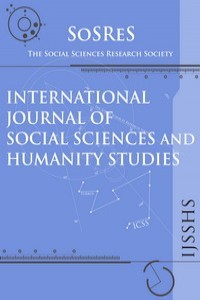PROFESSIONAL CONTENTMENT IN A RESEARCH UNIVERSITY: A CASE STUDY
PROFESSIONAL CONTENTMENT IN A RESEARCH UNIVERSITY: A CASE STUDY
Professional Contentment, Organization, Satisfaction,
___
- Alf Crossman and Bassem Abou-Zaki (2003), “Job Satisfaction and Employee Performance of Lebanese Banking Staff”, Journal of Managerial Psychology, Vol. 18, No. 4, pp. 368-376.
- Alf Crossman and Penelope Harris (2006), “Job Satisfaction of Secondary School Teachers”, Educational Management Administration & Leadership, Vol. 34, No. 10, pp. 29-46.
- Athonia Adenike (2011), “Organizational Climate as a Predictor of Employee Job Satisfaction: Evidence From Covenant University”, Business Intelligence Journal, Vol. 4, No. 1, pp. 151-165.
- Edwin A. Locke (1968), “Toward A Theory of Task Motivation and Incentives”, Organizational Behavior and Human Performance, Vol. 3, pp. 157-189.
- Edwin A. Locke (1976). The Nature and Causes of Job Satisfaction (in M.D. Dunnette -Ed., Handbook of Industrial and Organizational Psychology), Chicago: Rand McNally, pp. 1297-1349.
- Fauziah Noordin and Kamaruzaman Jusoff (2009), “Levels of Job Satisfaction Amongst Malaysian Academic Staff”, Asian Social Science, Vol. 5, No. 5.
- Frederick Herzberg, Bernard Mausner and Barbara B. Snyderman (1959), The Motivation to Work, New York: John Wiley and Sons.
- Frederick P. Morgeson and Humprey Stephen E. (2002), “The Work design Questionnaire (WDQ): developing and Validating a Comprehensive Measure for Assessing Job Design and The Nature of Work”, Journal of Applied Psychology, Vol. 91, No. 6, pp. 1321.
- Gary F. Koeske, S. A. Kirk, R. D. Koeske and M. B. Rauktis (1994), “Measuring the Monday blues: validation of a job satisfaction scale for the human services”, Social Work Research, Vol. 18, No. 1, pp. 27-35.
- Heng Lee Kiang, Hana Hamidi and Rusli Ahmad (2011), “Job Satisfaction and Job Performance: The Moderating Role of Gender Differences”, International Conference Human Resource Development, pp. 310-323.
- J. Richard Hackman and Greg R. Oldman (1976), “Motivation through the design of work: test of a theory”, Organizational Behavior and Human Performance, Vol.16, No.2, pp. 250-279.
- Michael J. Syptak, Marsland David W. and Ulmer, Deborah (1999), Job Satisfaction: Putting Theory Into Practice. American Academy of Family Physicians. http://www.Aafp.Org/Fpm/991000fm/26.Html, [Accessed 9.3.2009]
- Mohd Johan, R. (2004), Tahap Komitmen Pekerja Terhadap Organisasi dan Hubungannya Dengan Ganjaran: Satu Kajian di Kalangan Kakitangan Pembantu Tadbir di Majlis Perbandaran Muar. Universiti Teknologi Malaysia.
- Noor Harun Abdul Karim (2008), “Investigating the Correlates and Predictors of Job Satisfaction among Malaysian Academic Librarians”, Malaysian Journal of Library & Information Science, Vol. 13, No. 2, pp. 69-88
- Nur Ezwin, K. (2002), “Kepuasan Kerja: Satu Kajian di Kalangan staff di Direktorat Penguatkuasaan Dewan Bandaraya Kuala Lumpur (DBKL”). Universiti Teknologi Malaysia.
- Paul E. Spector (1987), “Interactive effects of perceived control and job stressors on affective reactions and health outcomes for clerical workers”. Work & Stress, Vol. 1, pp. 155-162. Paul E. Spector(1997), Job satisfaction: Application, assessment, causes, and consequences, Thousand Oaks, CA.: Sage.
- Richard A. Murray (1999), “Job Satisfaction of Professional and Paraprofessional Library Staff at the University of North Carolina at Chapel Hill” A Master’s paper for the M.S. in L.S. degree. University of North Carolina:
- Rim-Rukeh Akpofure, Grace Ikhifa, Imide O. Israel and I. E. Okokoyo (2006), “Job Satisfaction among Educators in Colleges of Education in Southern Nigeria”, Journal of Applied Sciences, Vol. 6, No. 5, pp. 1094-1098.
- Sunida Siripak (2006), “Job Satisfaction of Academic Staff in Mahidol University” Thesis of Master Project. Mahidol University.
- T. M. Begley and J. M. Czajka (1999), “Job Satisfaction: Organizational- commitment; Labor-turnover; Employees Health and Hygiene; Job-stress”, Journal of Applied Psychology, Vol. 78, pp. 552-556.
- Zainudin Awang and Junaidah Hanim Ahmad (2010), “Modeling Job Satisfaction and Work Commitment Among Lecturers. A Case of UiTM Kelantan”, Journal of Statistical Modeling and Analytics, Vol. 1, No. 2, pp. 45–59.
- Başlangıç: 2009
- Yayıncı: Sosyal Bilimler Araştırmaları Derneği
HOW DOES POVERTY WORK? REPRESENTATIONS AND CAUSAL ATTRIBUTIONS FOR POVERTY AND WEALTH
Maurizio NORCİA, Antonella RİSSOTTO
RIGHT INTENTION, NOT SO RIGHT OUTCOME: ADDRESSING DOMESTIC VIOLENCE THROUGH WOMEN'S CELL
Rasa BALVOČİŪTĖ, Solveiga SKUNČİKİENĖ
INTER-CLUSTER PIPELINES: THE DRIVING FORCE OF KNOWLEDGE CREATION AND ECONOMIC DEVELOPMENT
AUGMENTED REALITY AS AN EXCITING ONLINE EXPERIENCE: IS IT REALLY BENEFICIAL FOR BRANDS?
WAVELET COMOVEMENT ANALYSIS BETWEEN TENDENCY SURVEYS AND ECONOMIC ACTIVITY IN TURKEY
TRENDS IN AUTHORITARIANISM: EVIDENCE FROM 31 EUROPEAN COUNTRIES
Sabrina de Regt, Tim Smits, Dimitri Mortelmans
GLOBAL CHALLENGES AND BIOFUELS
Maria Fekete Farkas, Gabor Valko, Roland Toth
PROJECT PORTFOLIO SELECTION COMPETENCES RESEARCH IN UNIVERSITIES OF LITHUANIA
